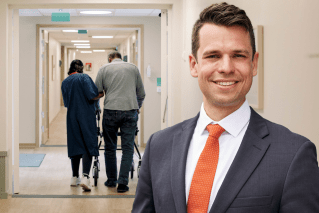David Fagan: I was clinically dead after a heart attack. This is what I learnt


David Fagan survived a heart attack while he was out on a run. Photo: Getty
It took only a day or two after I had died for well-meaning journalist friends to ask the question you’d expect.
“So you went to the other side,” they asked. “What was there?”
My response disappointed them and was less certain than the one Kerry Packer gave a few decades ago.
Mine was: “I don’t know because I don’t remember a thing. Before, during or after.”
His was the more definitive (as you’d expect of a billionaire): “I’ve been to the other side and there’s nothing there.”
A few weeks later, a well-wishing man of the cloth asked me a similar question but with a bit more needle. “I hear you went to the other side but can’t report what you saw there,” he messaged. “Which leaves me wondering what sort of journalist you really are!”
It was tempting to respond that his question left me wondering about him. But I had already tempted fate once and decided not to do it again.
That was four years ago. My heart attack was the real killer. A blockage in the artery known as the “widow-maker” stopped my heart pumping for several minutes while I was out running.
I had the extreme good fortune to cross paths with an off-duty medico who started the CPR which revived me then kept me alive until others and multiple ambulance crews arrived to give me two electric shocks which jolted my heart back to life.
The combination of a stent which opens the artery to keep the blood flowing, some mild medication and some modest lifestyle changes now have me living the same life I had before. Only one in eight people survive such an incident.
Life on the other side of a heart attack is good, far better now than it was three decades ago before the drug and equipment developments that make diagnosis more likely, recovery more complete and treatment less invasive.
But, still, heart disease remains one of our nation’s main causes of death.
While I missed seeing what was on the other side of life, I have since learnt a lot about the heart, that little pound of flesh which (as it is named) is at the heart of our survival.
A few heart facts courtesy of a recent little book, The Curious History of the Heart by Vincent M. Figueredo.
- The heart pumps abut 5.5 litres of fluid around the body every minute. Across a lifetime, this is the equivalent of a kitchen tap running at full strength for 50 years.
- In natural conditions, it pulses a little faster than once per second or more than 3 billion times over a lifetime. Each pulse is equivalent to the force you would apply to squeeze a tennis ball. Treated well, it doesn’t falter. Mine skipped several hundred consecutive pulses the day I died and now runs a little slower (as do I).
- The heart sits at the centre of the body’s circulatory system of arteries and capillaries which laid out en-to-end would stretch about 100,000km or twice the circumference of the Earth (that’s for each of us).
Little wonder the heart has always held such mythical qualities, not just as our body’s engine but as the proxy for our emotions (which thankfully still make it beat faster).
Heart health
Here are some other interesting heart numbers I’ve learnt since taking on a role as Chair of the National Heart Foundation’s Queensland Advisory Board.
- All our knowledge goes nowhere near eliminating the risk of heart disease. Some 2.5 million Australians are vulnerable over the next five years due to the combination of dietary, lifestyle and genetic factors.
- About one-third of heart attack victims suffer a second heart incident within a year of their first and an astounding 50 per cent stop taking their medication after a year (no coincidence here).
- People who live in communities amenable to walking are 58 per cent more likely to have a healthy cardiovascular risk profile.
- Women are not immune. Almost every hour of every day an Australian woman dies of heart disease.
- And heart disease is an economic disease. If impoverished Australians were able to replicate the nation’s better off citizens, then there would have been 8600 fewer heart deaths last year.
I don’t blame anyone else for my brush with death. It was a combination of genetics and some poor lifestyle choices in earlier years, offset by years of good lifestyle choices which helped me survive vital minutes, some amazing good luck and the incredible skills of a doctor passing by and nearby ambulance crews.
And that was all built on decades of research which continues to both show the way to better heart health and support recovery.
This week is Heart Week. Think of your own heart or the hearts of those you love with yours when you see the posters and promotions that celebrate not just this little pump, but life itself.
As to what sort of journalist I am? If you’re still reading, I must be OK. And if in any doubt about your own heart, don’t just heed this journalist’s warning but ask your GP for a 20-minute heart health check, still bulk-billable on Medicare. You’ve got to love that.
Disclosure: David Fagan is Chair of the Queensland Advisory Board of the National Heart Foundation








